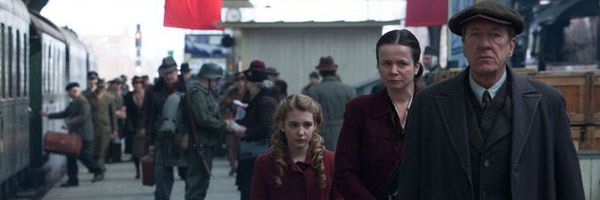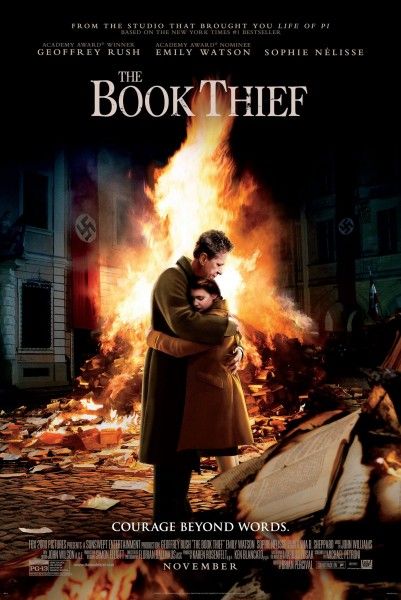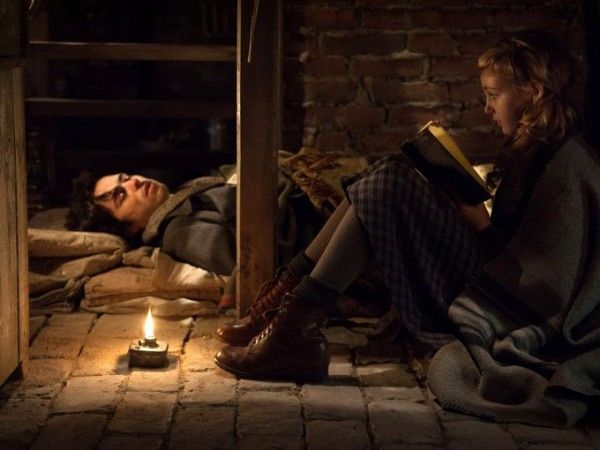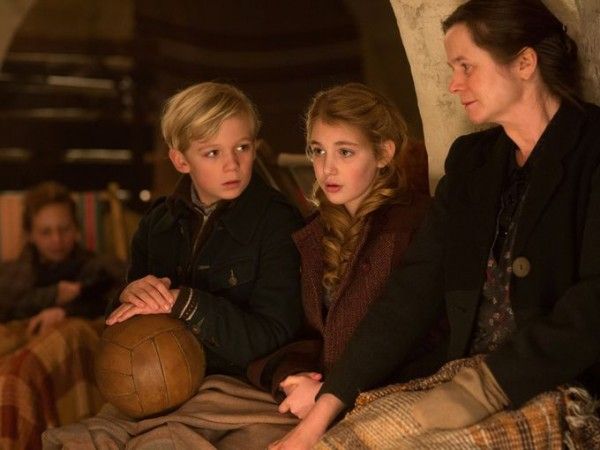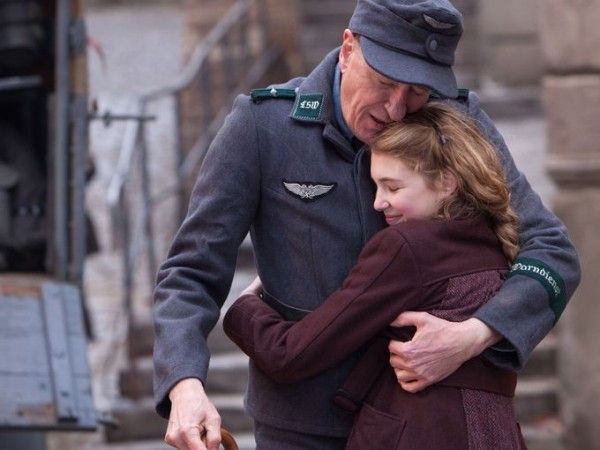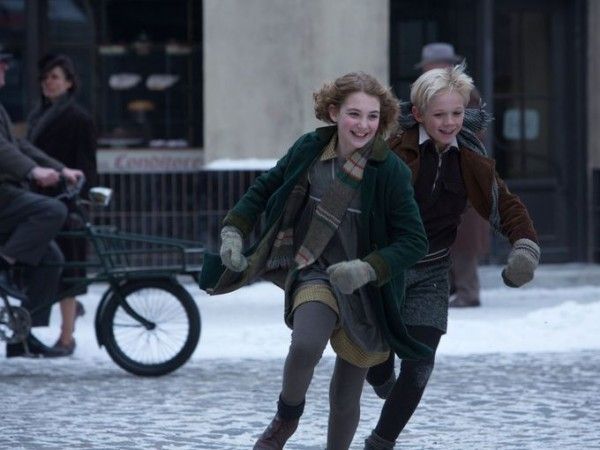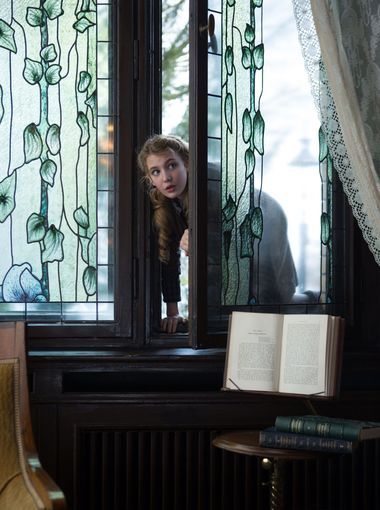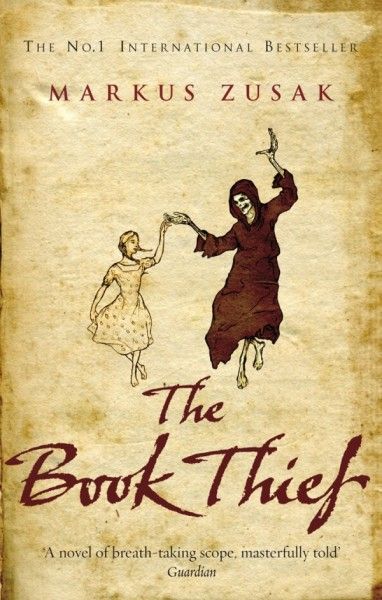The powerful story and courageous characters that sprang from the imagination of Markus Zusak in his international best-selling novel, The Book Thief, come to life on the screen in director Brian Percival’s moving film adaptation. In this life-affirming tale of courage and perseverance in the face of pervasive tyranny, a spirited young girl (Liesel/Sophie Nélisse) is sent to live with foster parents (Geoffrey Rush, Emily Watson) in Nazi Germany after losing her family. An impulsive act of thievery leads to a love affair with books and words that transform her and those around her. For more on the film, watch the trailer.
At the press day last week, we sat down with Percival and Zusak to talk about their collaboration, the challenges of transforming the world of the book to the screen, why certain scenes made it into the film while others did not, the rigorous international casting process to find the right actress to play Liesel, what Nélisse and Rush brought to their roles, and how S.E Hinton’s The Outsiders inspired Zusak to become a writer. They also revealed what they’re working on next: Percival’s upcoming film projects with Julian Fellowes and Zusak’s book in progress, Bridge of Clay, about a boy building a bridge. Hit the jump to read the interview:
QUESTION: It’s a big book and there had to be something that you’re in love with that you created that you couldn’t use. Do you have a favorite scene or section that couldn’t make it into the movie?
BRIAN PERCIVAL: The bit that I really looked at in the book, and it did leave quite a mark on me, was when Max imagines that he’s boxing Hitler. You get so lost in that scene. And then, it’s so poignant that at the end of it you realize he’s just standing alone in the cellar. It says so much about Max’s imagination and his spirit. Obviously, with 580 pages, there are some things that have got to go and that didn’t. It was more character-based and so it didn’t really move the plot forward as much. Also, there is a difficulty in actually having someone portray Hitler on film because it takes us out of the reality of the piece. He appears in the film once in actual newsreel footage. And somehow, in that sense, it gives us more of a real feel to the approach. If I had cast an actor to play Hitler and then we did this, I think it’s one of those scenes which is so wonderful but maybe it’s best left to the viewer’s imagination. It’s something that Markus has come up with. We can all imagine that scene in our heads and that maybe it wasn’t right for me to realize it.
MARKUS ZUSAK: We talked about this when we met up last year this time and that was the one scene we really talked about. We talked about that and we talked about Rudy becoming Jesse Owens. They were the two things that were possibilities but probably were not going to be in the film. I think, as the writer, you’re always going to mourn something. But you also just want to know there’s a good reason for it being left out. On the whole, you want to give something to somebody creative. The worst thing you can do is say, “Here, be creative, but do it like I want you to do it.” I was always very mindful of that. I understood a scene like Max boxing Hitler. In so many ways, it’s kind of poetry this way that you can see the film, and then if people go and read the book, they just uncover a few other things that a book can give you that a film can’t. And so, I was really happy with that. Probably a better way to talk about this for me is the idea of how the Liesel and Max relationship was in the book. He makes her stories within the story, and there wasn’t room for that in the film either. But I think what replaced it is one of the most beautiful parts of the film, which is the whole part about Max talking about every living thing having the secret word of life in it. What he does with the book is just magnificent. So I think bringing all of these ideas into one beautiful thing, that seems to me maybe that’s what … I mean, I don’t know anything about making a film, but as I learned as I’m going, that seems to have been done really beautifully.
You do get to see Rudy do a little of his Jesse Owens thing. It’s there.
ZUSAK: Yes. I think that’s testament to everyone involved with the film that we got together and we talked about things, and they listened to me, and Brian listened to me. (Joking) He just went, “I’ve been asked by the author from Australia. What am I going to do with him now?” I wanted to just have a chat and we talked about things. Just to do that once, and then for me to get out of the way, was the best way of doing things. I think it was in very capable hands.
Markus, as a writer, do you visualize that entire world while you’re writing it? And how much did the pictures in your head match what appeared on the screen?
ZUSAK: It’s pretty amazing, because you live with something for ten years of your life, and it’s all inside you, and then you come from the outside in. So when you get to the set, you don’t take these things in at the time. It takes a while. It will probably take me a few more years for all of this to sink in. The pictures in my head and what’s on screen are very accurate, and that world is very accurate to me. The beauty of my work is that my sets cost nothing. (Laughs) That’s what I love about being a writer of novels.
Brian, you’ve found the quintessential young Meryl Streep in Sophie. She was absolutely amazing. Was it a difficult process to find someone who could play that character and also how she ages from 11 to 17?
PERCIVAL: Liesel is so special. I mean, she stands out on a planet full of people. We notice her because she’s special. We had a huge challenge. We started in Europe, and we started next thing in England, and then we went through to Germany, to Austria, to Switzerland, and then up to Scandinavia. We still couldn’t find anybody. It’s a difficult mix because she’s got to have so much spirit and character and a feisty nature to her. But, at the same time, she’s got to have this innocent vulnerability about her. We were finding girls that were either one or the other, but that weren’t both. They’d fall quite easily into one of the two categories. And then, we spread the net wide and went down to Australia and over to America and Canada. Markus mentioned that she was in Monsieur Lazhar, which is a film that I was aware of and I wanted to see. So I went and looked at it and thought, “She’s really, really good and really interesting.”
It’s a French Canadian film. It’s quite a tragic film. It’s about a suicide of a teacher and a replacement teacher comes in and how that impacts upon everyone. And then, through this network of casting directors we had all over the world by that point, we asked Sophie to self-tape. I remember getting the tape and downloading it and just seeing a self-tape that her mother had filmed. She only had two or three scenes, so she didn’t know the whole story. She hadn’t read the book. But there was just something about her that was special. There was a spirit there and these eyes, and I thought, “I think we might have found her.” And so, we had an initial audition in Los Angeles and she was jet lagged. She was still great and sparky, but she had just got off of a long flight from Canada. She was shortlisted and we did a screen test in Berlin. I didn’t have much time with her because she had a commitment she had to go back for. I remember one of the scenes we tested was when Liesel is in the car at the beginning and she’s listening to Hans and Rosa. It’s their introduction really, but she’s listening to them talk to Frau Heinrich.
We tested Sophie and the other girls, and for me, that was it. She was Liesel. I don’t think we could have found anybody better. She made it her own. Sophie is such an incredible character, and I think she’s special in the way that Liesel is special. One thing you have to do, I always think, and I’ve always tried to do this, particularly when you’re casting teenagers, is to find someone who is…because they haven’t learned technique normally. Sophie has got remarkable technique. Every time she does a scene, she’s so aware. But normally, when you cast teenagers, you have to find somebody who is close to that character and then let them be themselves, because that makes the performance feel natural. There’s no point in me telling an accomplished stage actress of 12 or 13 years old to do it this way or do it that way or do this. The whole thing is about letting them be themselves, and I just guide them through that process and mold them gradually into Liesel, and Liesel gradually into Sophie. They become one. That’s my approach, and she’s been absolutely terrific. She’s just astounding as always with her spatial awareness, the way that she senses the nuance, and the depth of thought that she puts into the performance. It’s all quite breathtaking for someone that age.
Can you talk about what Geoffrey Rush brought to the role?
PERCIVAL: Oh, he’s wonderful. He’s known for playing these larger than life characters more than anything. We chatted on the telephone for quite some time when I sent him the script. I said I wanted it to be as natural as possible. And that’s I think what appealed to him because he said he wanted to play someone that for once was just a regular guy. On the set, he’s an ordinary character. He’s a painter and decorator but he’s incredibly emotionally intelligent. I think that’s what drew Geoffrey to the part because he wasn’t playing somebody that was flamboyant. He was playing someone that was very gentle with a heart and really quite an ordinary person. But it’s only as we strip away the layers of that character that we find that he’s actually quite complex. Underneath, he’s quite a radical for his time and place in Germany to do what he did. So that was something that appealed to him. The wonderful thing about his performance is that he’s so natural, and there’s so much warmth that he gives that you feel the connection between Hans and Liesel. You really feel that he loves this child, and you possibly get the sense in the film, which I know wasn’t true to the book, that this is the daughter that he always wanted that he hadn’t had before.
How did you go about creating the look of the film which is very sumptuous? Were there any cinematic touchstones that you were referencing?
PERCIVAL: It’s tricky because Markus has got these incredible, vivid descriptions of skies which really surprised me – chocolate-colored skies and burning newspapers -- and it’s all about colors, which I thought was beautiful to read. But if I tried to copy that in the film, then it would take us out of the realism that I was trying to create. It wouldn’t feel natural. Everybody would go, “That sky looks a bit strange.” Again, it’s better. It’s one of those things in the book that I leave to you as an audience to imagine once you read it on the page. My approach really was there were two things that I had to accomplish. One was I didn’t want to use Death’s voice so constantly throughout because I felt that then gets in the way of me trying to build a relationship between the characters on the screen and you as an audience. That’s what we gave them.
So the way through that, which was not used as much but quite often in the film, was when I read the screenplay, I just kept getting this image in my head of the camera going high all the time, going high and starting back. So we’d see a scene and we’d get very involved with this scene and the characters, and then I’d say somewhere possibly towards the end of the scene, we’d pull back and go up and high. That would just hopefully remind the audience in a subliminal way that we’re seeing this from another perspective, and that would create a link with Death that wasn’t too intrusive upon our relationship with the characters. And then, I didn’t want it to be somber. These are poor people, but they’ve got very rich characters. I wanted there to be a richness and a depth to the color without it being colorful.
So I didn’t want it to be in black and white and gray. I wanted it to be a very welcoming, inviting world but with a richness and a depth. Anna Sheppard is a terrific costume designer and Simon Elliott is the production designer. We worked together on a color palette that we knew would work. It would still feel like an impoverished part of the world that they lived in, but it had a richness about it. And then, other than that, I tried to step back. I didn’t want to do anything too flashy with the camera or do anything where an audience becomes aware of me telling the story. In some ways, I’ve tried to make myself as invisible as possible so that I didn’t get in the way. Here are the characters. Here’s the story. You as an audience watch this and don’t say that I’m leading you to think this or to think that or whatever. The only intention was to bring Markus’ message to a wider audience.
Markus, what was the first book you read that inspired you?
ZUSAK: I was 14 when I read The Outsiders by S.E. Hinton however many years after it was published. I remember staying up in my bedroom which I shared with my brother who was a complete bastard, of course. He was a couple of years older than me. I remember just leaving the light on. I remember vividly the yellow light of our bedroom like it was, and I just remember staying up all night to read it. I grew up playing rugby league. There are a couple of different kinds of rugby. This was the really working class kind of thing, and it was a big thing, and I had a game the next day. I would never have stayed up ordinarily but that book was like… It was one of the times where you’re reading a book and you’re turning the pages, but you don’t even notice you’re turning the pages. A few years later, when I started to have the experience more and more, I thought to myself, “That’s what I want to do. I want to be able to do that.” And so, I tried to write. That was when I tried to write my first book when I was 16. It could easily have been entered into a competition for the worst book ever written, all 8 pages of it. But it started probably with The Outsiders. It’s not a coincidence either that it’s at that sort of age, and you look at Leisel coming through the years in this story, and then you see it in the film. They’re such formative years and you feel things so intensely. When you feel something like that, as I did with that book, it’s almost extra, extra intense. You start to dream about things. I loved books as a younger child as well, but that was probably the first one that really lit a fire to become a writer.
Was there any conflict that arose about something that didn’t translate well from your book to the screen or anything they you had hoped would be portrayed in the film and wasn’t?
ZUSAK: No. I was hoping that there would be differences to be honest. I know that might be hard to believe, but I wanted to be surprised, and I wanted something new to happen. I wanted it to be faithful in the sense of it adventuring on. My one hope was that the film would be different but the heart of the book would still be in it. And if someone was to say to me, “What’s your book about?,” I’d say, “Well it’s about the idea that stories make us who we are.” And in this case, the story is about how, on the one hand, in that world, you had Hitler destroying people with words and propaganda, and on the other hand, you’ve got a girl who’s stealing the words back and writing her own story with them. It’s a beautiful story written amongst this devastating world. If you said to me, “What do you think the film is about?,” I would say that. It’s just my opinion.
I’ve got to say, I saw the film for the first time last Friday, and I’m even starting to get a bit emotional now thinking about it, because you go there and you’ve lived with this for 10 years, in the writing of it and everything that’s happened since, and then you sit there and then something happens. Probably the best example I can give you is when there’s the book burning, and afterwards Liesel coughs up the book, and then Hans hugs her and he lets go, and she doesn’t let go. And that, to me, was where everything just… It’s almost like you feel the walls fall down around you and you just say, “Alright. I’m with this now.” I’ve been enjoying it up until that point as well obviously, but that was when I just let the film carry me in its current. It’s that helpless but happy feeling of letting it take you where it wants to go. So no, I was more than happy for a few surprises. Like I said, you put something in the hands of someone creative and then you’ve just got to trust them. I think in the case of Brian and the producers and those performances as well, they are just magnificent. I was really happy.
Can each of you talk about what you’re working on next?
PERCIVAL: I’ve got a couple of projects that I’m attached to and other films, two of which actually are with Julian Fellowes who wrote Downtown Abbey.
It’s going to be good. Whatever it is I want to see it. Is it Emma and Nelson?
PERCIVAL: (Laughs) Well, there’s also something else as well, but there is that one. But I don’t know at the moment. My head is still full of The Book Thief and we’re going to be publicizing probably until Easter next year. It’s got to be an awfully good script to top this one because it’s been my life now for nearly two years since I first read the script. This has been an incredible journey and a wonderful one. I’ll see what happens come next Easter.
ZUSAK: That’s funny. I can joke around him and say, “Two years? That’s nothing!” For me, I have to say, I’ve been living with this book and the writing and everything that’s happened since and it’s been nearly 10 years. This to me is sort of like the last beautiful wave of it. And then, I have to just forget it. I’ve loved every minute of it. It’s been a gateway to the world for me, this book. I’ve been in so many places and seen things that I never could have. I’ve been working on a book in the last seven years since this one came out, and I’ve really been struggling with it because that book meant everything to me. I’ve written four other books that have meant something to me, but when you write one that means everything to you, you don’t want to go back to something. But now it feels different. Now it feels like it’s time. It’s not like I’m following up The Book Thief anymore. It’s like I’m writing something new to forget it, but in a positive way. It just needs to be left back there and left alone. It’s time to be the writer of a different book. I’ve been working on it for a while. It’s about a boy who’s building a bridge and he’s building his life into that bridge (The book is called Bridge of Clay). We’ll see what happens.
The Book Thief is now playing in limited release.

